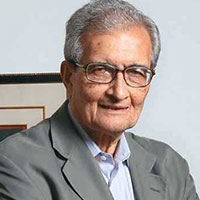Amartya Sen
Amartya Kumar Sen is an Indian economist and philosopher, who since 1972 has taught and worked in the United Kingdom and the United States.
Amartya Sen, an Indian economist who was awarded the 1998 Nobel Prize in Economic Sciences for his contributions to welfare economics and social choice theory and for his interest in the problems of society’s poorest members. Sen was best known for his work on the causes of famine, which led to the development of practical solutions for preventing or limiting the effects of real or perceived shortages of food.
Sen was educated at Presidency College in Calcutta (now Kolkata). He went on to study at Trinity College, Cambridge, where he received a B.A. (1955), an M.A. (1959), and a Ph.D. (1959). He taught economics at a number of universities in India and England, including the Universities of Jadavpur (1956–58) and Delhi (1963–71), the London School of Economics, the University of London (1971–77), and the University of Oxford (1977–88), before moving to Harvard University (1988–98), where he was professor of economics and philosophy. In 1998 he was appointed master of Trinity College, Cambridge—a position he held until 2004, when he returned to Harvard as Lamont University Professor.
Welfare economics seeks to evaluate economic policies in terms of their effects on the well-being of the community. Sen, who devoted his career to such issues, was called the “conscience of his profession.” His influential monograph Collective Choice and Social Welfare (1970)—which addressed problems such as individual rights, majority rule, and the availability of information about individual conditions—inspired researchers to turn their attention to issues of basic welfare. Sen devised methods of measuring poverty that yielded useful information for improving economic conditions for the poor. For instance, his theoretical work on inequality provided an explanation for why there are fewer women than men in some poor countries in spite of the fact that more women than men are born and infant mortality is higher among males. Sen claimed that this skewed ratio results from the better health treatment and childhood opportunities afforded to boys in those countries.
Sen’s interest in famine stemmed from personal experience. As a nine-year-old boy, he witnessed the Bengal famine of 1943, in which three million people perished. This staggering loss of life was unnecessary, Sen later concluded. He believed that there was an adequate food supply in India at the time but that its distribution was hindered because particular groups of people—in this case rural labourers—lost their jobs and therefore their ability to purchase the food. In his book Poverty and Famines: An Essay on Entitlement and Deprivation (1981), Sen revealed that in many cases of famine, food supplies were not significantly reduced. Instead, a number of social and economic factors—such as declining wages, unemployment, rising food prices, and poor food-distribution systems—led to starvation among certain groups in society.
Governments and international organizations handling food crises were influenced by Sen’s work. His views encouraged policy makers to pay attention not only to alleviating immediate suffering but also to finding ways to replace the lost income of the poor—as, for example, through public-works projects—and to maintain stable prices for food. A vigorous defender of political freedom, Sen believed that famines do not occur in functioning democracies because their leaders must be more responsive to the demands of the citizens. In order for economic growth to be achieved, he argued, social reforms—such as improvements in education and public health—must precede economic reform.
…work of the Indian economist Amartya Sen led to a major reorientation in the study of famines. In works such as Poverty and Famines (1981), Sen challenged the prevailing “FAD hypothesis,” the assumption that total food-availability decline (FAD) is the central cause of all famines. Sen argued that the more…
Sen also pointed out that the standard measure of poverty in a society, the proportion of people who are below a poverty line, leaves out an important datum: the degree of poverty among the poor. He came up with a more complicated index to measure not only poverty but also its degree.
Sen studied famines in various parts of the world and pointed out that they sometimes occurred even when there was no decline in food output. Some famines occurred when the real income of specific groups fell so that these groups could no longer afford to buy food. In such cases, most economists would advocate giving money to such people so that they could buy food and make their own trade-offs between food and other things. Along with coauthor Jean Drèze, Sen, though no strong believer in economic freedom, defended this standard economist’s view and argued mildly against price controls on food because such controls would reduce the amount of food produced.
Sen was a moderate defender of free markets
He is currently a Thomas W. Lamont University Professor, and Professor of Economics and Philosophy at Harvard University.

Amartya Sen
Date of Birth: 03 Nov 1933
Birth Place: Santiniketan
Proffession: Indian economist
Nationality: India


